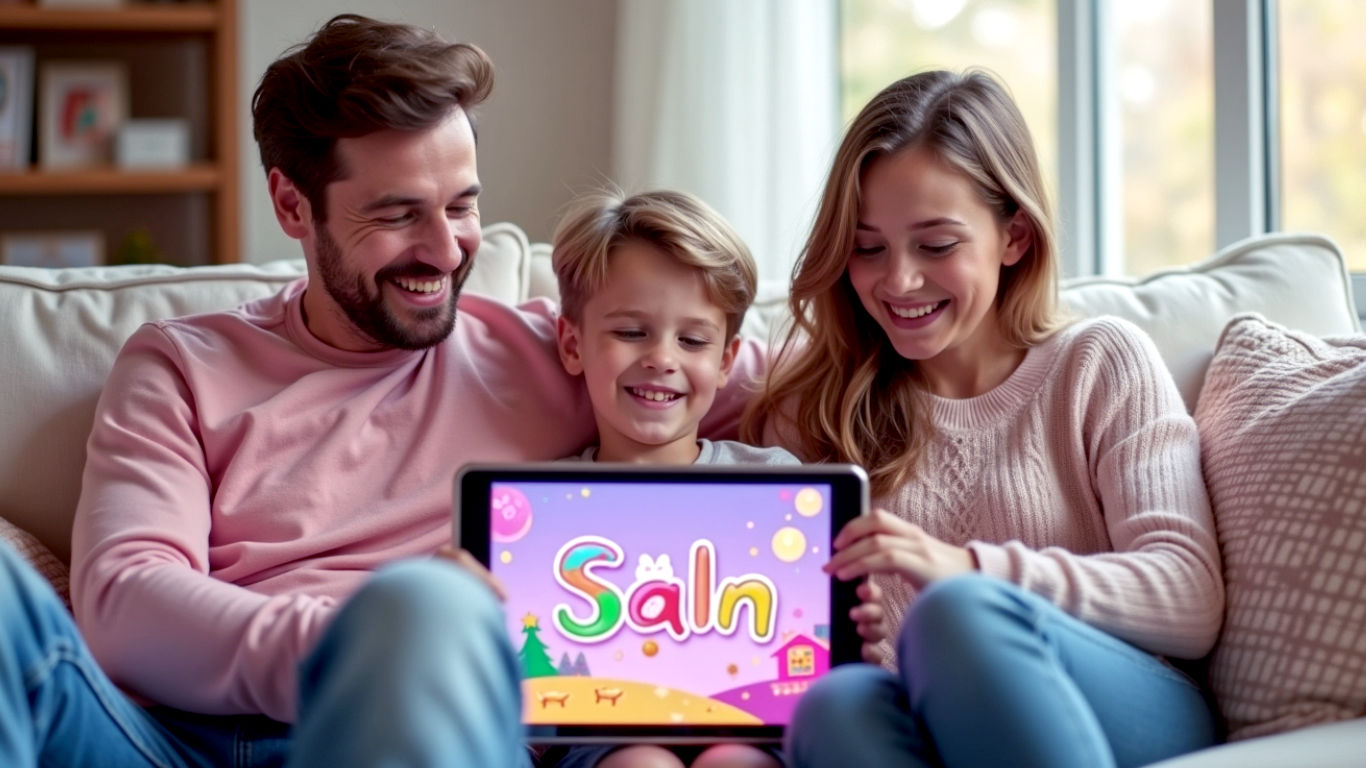The 10 Best Spelling Apps for Boosting Your Skills
Find the perfect spelling app to improve your skills. Our definitive guide reviews the top 10 apps for children, teens, and adults available in the UK.

This post may contain affiliate links. If you make a purchase through these links, we may earn a commission at no additional cost to you.
Ever sent a text message so quickly you didn’t notice autocorrect had changed “meeting” to “meating”? Or perhaps you’ve stared at a word like “necessary,” wondering if it’s one ‘c’ and two ‘s’es, or the other way around. You’re not alone. English spelling can be a real head-scratcher. With its jumble of silent letters, odd rules, and words borrowed from all over the world, it often feels like it’s designed to trip us up.
In a world filled with spell checkers and autocorrect, you might think spelling doesn’t matter much anymore. But it really does. Good spelling makes your writing clear and shows you’ve taken care. Whether you’re a student writing an essay, an adult sending an important work email, or just someone who wants to feel more confident, getting your spelling right makes a huge difference.
The brilliant news is that you don’t have to struggle with dusty old dictionaries. Technology, the very thing that sometimes makes us lazy with our spelling, can also be our greatest ally. There are now hundreds of clever apps designed to make learning to spell fun, easy, and effective. They’re like having a personal spelling tutor right in your pocket.
But with so many options out there, how do you choose the right one? That’s where this guide comes in. We’ve done the hard work for you, testing and reviewing the very best spelling apps available in the UK. We’ll look at apps for young children just starting out, for teenagers facing their GCSEs, and for adults who simply want to sharpen their skills. Let’s dive in and find the perfect app to turn you into a spelling champion.
Why Bother with Spelling in the Age of Autocorrect?
It’s a fair question. Your phone fixes your typos, and your computer underlines dodgy words in red. So, why spend time learning to spell words like “liaison” or “onomatopoeia”?
Well, think about it like this. Relying on autocorrect is a bit like using a satnav to get everywhere, even to your local corner shop. It gets you there, but you never actually learn the route yourself. You’re dependent on the technology. If it fails, or if it ‘corrects’ you to the wrong word (we’ve all been there), you’re a bit stuck.
Here’s why good spelling is still a superpower:
- It Shows You’re Professional: In the working world, good spelling is a sign of professionalism and attention to detail. An email or report full of mistakes can make you look careless, even if you’re brilliant at your job. It’s about making a good first impression.
- It Makes Your Meaning Clear: Sometimes, a small spelling mistake can completely change the meaning of a sentence. Think about “their,” “they’re,” and “there,” or “your” and “you’re.” Getting these right stops your reader from getting confused and helps you get your point across clearly.
- It Boosts Your Confidence: When you know how to spell, you can write more freely and confidently. You don’t have to pause and second-guess yourself. This is a huge advantage, whether you’re writing a university application, a creative story, or just a simple birthday card.
- It Strengthens Your Reading Skills: Spelling and reading are two sides of the same coin. When you understand how words are built (the patterns, the prefixes, the suffixes), it helps you decode new words you come across when reading. It expands your vocabulary and makes you a better reader.
Autocorrect is a useful tool, like a safety net. But it’s no substitute for actually knowing your stuff. Learning to spell properly gives you a fundamental skill that will help you in all areas of your life.
How to Pick the Perfect Spelling App for You
Choosing a spelling app can feel overwhelming. There are so many, all claiming to be the best. To find the one that’s right for you or your child, it helps to think about a few key things.
Know Your Goal
What do you want to achieve?
- For young children (ages 4-7): The goal is to make learning fun. You want an app that uses games, colourful characters, and simple phonics to introduce the basics of spelling in a playful way.
- For older children (ages 8-12): They need something a bit more structured. Look for apps that cover trickier spelling rules, build vocabulary, and maybe align with the school curriculum. Gamification (turning learning into a game) is still key to keeping them engaged.
- For teenagers (GCSEs and beyond): At this stage, it’s about mastering complex vocabulary and tricky words needed for exams. Apps that use quizzes, spaced repetition (a clever technique that shows you words just before you forget them), and custom word lists are ideal.
- For adults: You might want to fix common mistakes, expand your professional vocabulary, or prepare for a test. Look for apps that are customisable, offer detailed explanations, and track your progress over time.
Key Features to Look For
Once you know your goal, look out for these features:
- Personalised Learning: The best apps adapt to your level. They work out which words you find tricky and give you more practice on them. This is much more effective than a one-size-fits-all approach.
- Gamification: Learning shouldn’t be a chore. Apps that use points, leaderboards, rewards, and mini-games make the process fun and motivating. You’ll be so busy trying to beat your high score, you’ll forget you’re even learning.
- Custom Word Lists: This is a brilliant feature. It lets you add your own words to practise. Students can add words from their weekly spelling tests, and adults can add words they struggle with at work.
- Different Ways to Learn: We all learn differently. A good app will use a mix of methods – not just typing words out. It might include word searches, anagrams, listening exercises (where you spell what you hear), and flashcards.
- Progress Tracking: It’s really motivating to see how far you’ve come. Look for apps that show you your scores, the words you’ve mastered, and the areas you still need to work on.
A Note on Cost
Many apps are free, but they often come with adverts or limited features. A paid subscription usually unlocks more content and provides a smoother, ad-free experience. Often, you can get a free trial to see if you like the app before you commit. We’ve included a mix of free and paid options in our list to suit every budget.
The Top 10 Spelling Apps for UK Users
Right, let’s get to it. Here are our top 10 spelling apps, chosen for their effectiveness, ease of use, and suitability for a British audience.
1. Sir Linkalot Spelling
- Best for: Primary school children and visual learners.
- Price: Free for the app with lots of content. A premium subscription (£9.99/year) unlocks everything. Schools can also subscribe.
- Available on: iOS, Android.
Sir Linkalot is a wonderfully bonkers and uniquely British app that turns spelling into a memorable story. It’s based on the idea of mnemonics – using funny little animations and word associations (called ‘links’) to help words stick in your brain. For example, to remember how to spell “because,” you might see a cartoon of a Big Elephant Carefully Analysing Underwater Seaweed Elegantly.
Why We Love It
The app is presented by the energetic and charismatic “Sir Linkalot” himself. The animations are quirky, funny, and genuinely effective. It’s particularly brilliant for those tricky words that don’t follow the rules. It covers hundreds of words from the National Curriculum, making it perfect for kids in the UK. The app also includes punctuation and grammar, so it’s a great all-round literacy tool.
What Could Be Better
The high-energy presentation might not be for every child (or parent!), but for most, it’s a huge part of the fun. The free version is generous, but you’ll want the subscription to get the most out of it.
2. Spelling Shed
- Best for: Making spelling practice feel like a game.
- Price: A subscription is required. A personal/family plan is around £30/year. Many UK schools subscribe, so your child may have free access.
- Available on: Web, iOS, Android.
Spelling Shed is hugely popular in UK primary schools, and for good reason. It takes a game-based approach to learning spelling. Children create their own avatar and earn honeypots by playing spelling games. They can play against their classmates or other children around the world.
Why We Love It
The app is aligned with the UK National Curriculum, so the word lists are directly relevant to what children are learning in school. There are different levels of difficulty, from easy (just spelling the word) to extreme (a fast-paced game with tricky letter patterns). The app also uses phonics and teaches spelling rules, so it’s not just about memorising words. The competitive element really motivates kids to practise.
What Could Be Better
It really requires a subscription to be useful, and you’ll need to check if your child’s school is subscribed to get it for free.
3. DoodleSpell
- Best for: Personalised learning that adapts to your child.
- Price: Free version with limited access. A premium subscription (around £7.99/month or £69.99/year) unlocks all features.
- Available on: iOS, Android, Web.
DoodleSpell is part of the excellent DoodleLearning family of apps. Its standout feature is its clever algorithm, called Proxima™, which works out your child’s strengths and weaknesses and creates a unique learning programme just for them. It promises that just 10 minutes of use a day (“a little and often”) can make a real difference.
Why We Love It
The personalisation is fantastic. It ensures your child is always working at the right level – not too easy that they get bored, and not so hard that they get discouraged. The app covers the entire UK primary spelling curriculum. It also has a great feature where you can add your own school spelling lists. The parent dashboard is brilliant for tracking progress.
What Could Be Better
Like many of the best apps, you really need to subscribe to get the full benefits. The cost can add up, especially if you have more than one child.
4. Squeebles Spelling Test
- Best for: Practising weekly school spelling lists.
- Price: One-off purchase of £3.99. No ads or subscriptions.
- Available on: iOS, Android, Kindle Fire.
Squeebles is a much-loved series of educational apps from a UK-based family company. Squeebles Spelling Test allows parents or teachers (or even the children themselves) to set up personalised spelling tests. You record yourself saying each word, and the child then spells it out.
Why We Love It
This app is the perfect homework helper. It makes practising for the weekly spelling test fun. When children get words right, they earn stars, which they can use to trade for characters in a fun mini-game called Squeeberang. It’s simple, effective, and kids love it. Because you record the audio yourself, it works with any word list in any language, and in your own accent. The one-off price is also great value.
What Could Be Better
It’s more of a testing tool than a teaching tool. It doesn’t teach spelling rules or patterns, so it’s best used alongside classroom learning.
5. VocabularySpellingCity
- Best for: All-round vocabulary and spelling practice.
- Price: Free version with limited games. A premium membership (around £25/year for a family) unlocks over 40 games and features.
- Available on: Web, iOS, Android.
This is a powerhouse of a learning tool that goes beyond just spelling. As its name suggests, it also focuses heavily on building vocabulary and comprehension. You can use their pre-made word lists (which cover everything from phonics to exam prep) or create your own.
Why We Love It
The variety is incredible. There are dozens of games and activities for any word list, catering to all learning styles. There are word searches, crosswords, and listening games. For each word, the app provides definitions, synonyms, antonyms, and example sentences. This helps children understand the words, not just memorise how to spell them. It’s a brilliant resource for school-aged children right up to teens.
What Could Be Better
The website and app interface can feel a bit busy and dated compared to some of the slicker, more modern apps. The sheer number of options can also be a little overwhelming at first.
6. Spelling Master
- Best for: Quick, fun, and free spelling games.
- Price: Free (with ads).
- Available on: Android.
Sometimes you just want a simple, fun game to pass the time while also sharpening your brain. Spelling Master is perfect for this. It’s a collection of fast-paced spelling games that are surprisingly addictive.
Why We Love It
It’s incredibly easy to pick up and play. The games are challenging but fun. One game asks you to find the correctly spelled word from a list of similar-looking ones, while another challenges you to identify all the misspelled words in a paragraph. It includes thousands of words and tracks your high scores. It’s great for adults and older teens who want a no-fuss way to practise.
What Could Be Better
It’s only available on Android. The ads can be a bit intrusive, but that’s the trade-off for a free app. It’s also more for practice and fun rather than a structured learning programme.
7. Wordscapes
- Best for: A relaxing way to improve spelling and vocabulary.
- Price: Free (with ads and in-app purchases).
- Available on: iOS, Android.
While not strictly a “spelling app,” Wordscapes is a hugely popular word game that has fantastic benefits for your spelling. The concept is simple: you’re given a wheel of letters, and you have to swipe to form words to fill in a crossword-style puzzle.
Why We Love It
It’s incredibly relaxing and satisfying to play. You start with simple three-letter words, but the puzzles quickly become more challenging, forcing you to think about letter patterns and combinations. It’s a brilliant way to expand your vocabulary and improve your spelling without it feeling like work. The beautiful landscape backgrounds are a nice touch.
What Could Be Better
It doesn’t teach you why a word is spelled a certain way, so it’s not a replacement for a proper learning app. The in-app purchases and ads can be a bit persistent, but you can play for free if you have a bit of patience.
8. Memrise
- Best for: Mastering tricky words with spaced repetition.
- Price: Free version with core features. Memrise Pro subscription (from around £7.50/month) unlocks all content.
- Available on: Web, iOS, Android.
Memrise is famous for being a language-learning app, but its powerful learning system can be used for almost anything – including spelling. It uses a clever technique called “spaced repetition.” The app learns how well you know a word and then tests you on it just before you’re about to forget it. This is scientifically proven to be one of the most effective ways to memorise information.
Why We Love It
You can find hundreds of pre-made courses on English spelling, from common misspellings to advanced vocabulary. Or, even better, you can create your own course with the exact words you want to learn. The app uses a mix of tests and funny videos or mnemonics created by other users to help the words stick. It’s a fantastic tool for teens and adults who are serious about improving their spelling.
What Could Be Better
It’s not designed specifically for spelling, so you have to search a bit to find the right courses. It lacks the playful, game-like feel of the apps designed for children.
9. Quizlet
- Best for: Students and lifelong learners.
- Price: Free (with ads). Quizlet Plus subscription (around £35/year) removes ads and adds features like offline access.
- Available on: Web, iOS, Android.
Quizlet is a flashcard-based learning app that is incredibly popular with students all over the world. It’s a simple but powerful tool for memorising information, including spellings. You can create your own digital flashcard sets (or “study sets”) or search through millions of sets created by other users.
Why We Love It
It’s incredibly versatile. Once you have a study set, Quizlet can turn it into different activities. “Learn” mode tests you with multiple-choice questions, while “Write” mode gets you to type out the word or definition. There’s even a fun “Match” game where you race against the clock. It’s an excellent, flexible tool for GCSE or A-Level students who need to learn both the spelling and meaning of key vocabulary.
What Could Be Better
The quality of the pre-made study sets can vary, as they are user-generated. For spelling, it’s often best to create your own lists to ensure they are accurate.
10. Simplex Spelling Phonics
- Best for: A deep dive into English phonics and spelling rules.
- Price: A series of apps with one-off costs, typically around £4.99 each.
- Available on: iOS.
For learners who want to understand the ‘why’ behind English spelling, the Simplex Spelling apps are outstanding. They take a systematic, phonics-based approach, teaching the rules, patterns, and exceptions of the English language.
Why We Love It
This is a seriously educational app. It doesn’t just test you; it teaches you. It has a unique “reverse phonics” approach that breaks words down into their individual sounds. When you make a mistake, the app provides instant feedback, explaining the rule you need to know. It’s a very thorough and effective programme for learners who are struggling with the logic of spelling.
What Could Be Better
It is only available on iOS devices. The interface looks a little dated, and its serious, educational focus might not appeal to children who prefer game-based learning. It’s also split into several different apps, so you need to choose the right one for your level.
Getting the Most Out of Your Spelling App
So, you’ve chosen an app. What’s next? Here are a few tips to make sure you get the best results.
- Be Consistent: Like any skill, spelling improves with regular practice. Aim for just 10-15 minutes every day. This is far more effective than a long session once a week. The “little and often” approach helps to build a strong habit and keeps the information fresh in your mind.
- Make it a Family Activity: If you’re helping your child learn, get involved! Have a family spelling bee using an app like Squeebles. Challenge each other on Spelling Shed. When kids see you having fun and valuing a skill, they’re much more likely to do the same.
- Go Beyond the App: The app is your training ground, but the real world is where you put your skills to the test. Encourage your child to write stories, letters, or a diary. For adults, take the time to proofread your emails and reports carefully. The more you read and write, the more natural good spelling will become.
- Don’t Be Afraid of Mistakes: Everyone makes mistakes. They are part of the learning process. The great thing about these apps is that they provide a safe space to get things wrong and learn from them without any judgment. Celebrate progress, not perfection.
English spelling can be tough, but with the right tools and a bit of practice, anyone can improve. These apps offer a modern, fun, and incredibly effective way to build confidence and master the written word. Whether you’re five or fifty-five, there’s an app out there ready to help you on your journey to becoming a spelling superstar. So why not download one today and give it a go? You might just be surprised at how much fun you have.
Further Reading
For those who wish to delve deeper into the world of English spelling and literacy, these resources are highly respected and offer a wealth of information:
- The National Literacy Trust: An independent UK charity working with schools and communities to give disadvantaged children the literacy skills to succeed in life. https://literacytrust.org.uk/
- Oxford Owl for Home: A fantastic free resource from Oxford University Press, packed with tips and activities to help children with reading and spelling at home. https://www.oxfordowl.co.uk/for-home/
- BBC Bitesize: The BBC’s free online study support resource for school-age students in the United Kingdom. It has excellent sections on English spelling, grammar, and punctuation. https://www.bbc.co.uk/bitesize
- The Spelling Society: An organisation dedicated to raising awareness of the problems caused by the irregularity of English spelling and promoting improved literacy. https://spellingsociety.org/






